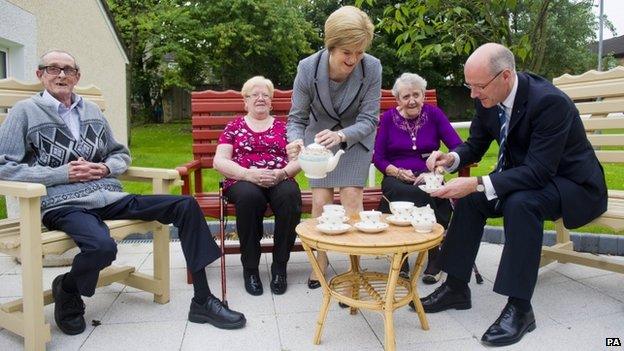Scottish independence: Holyrood hears that pensions matter
- Published

Deputy First Minister Nicola Sturgeon and Finance secretary John Swinney met [from left] Norrie Hughes 69, May McAleese 80, and Margaret Parker 80.
Arithmetic dictates that it will be quite some time before Nicola Sturgeon, Gavin Brown, Willie Rennie and Drew Smith are drawing their state pension. For which a grateful nation rejoices.
So, there was nothing instantly personal about the exchanges at Holyrood.
Nonetheless, those exchanges were notably sharp, perhaps most particularly on Ms Sturgeon's part. The reason, of course, is not hard to discern. Pensions really matter.
They matter because it is important to provide relative security in old age. They matter because their cost forms a very substantial proportion of the demands upon the public purse - and hence they are a core issue in political debate.
They matter also because the recipients of pensions are inclined to vote - either out of duty, ingrained habit or a recognition that politicians tend to pay attention to those who turn up at the polling stations. (Remember always that the great sage in politics is Eddie Cochran with his seminal observation: "I'd like to help you son but you're too young to vote.")
And so the pensions paper launched, external by Ms Sturgeon and John Swinney formed the basis of a topical question at Holyrood today. (On which topic, incidentally, plaudits to the Presiding Officer for this innovation of topicals. It works.)
The said question was posed, innocently enough, by Gavin Brown of the Conservatives. On the face of it, he was merely seeking a tiny degree of clarification.
One or two stats. Nothing to fret about.
Nicola Sturgeon, of course, could see it coming. And so she responded with full vigour. Scotland would be the 8th richest country in the OECD. Scotland could comfortably afford state pensions.
Independence was the only way to ensure that pension decisions would be in Scottish hands.
In response to Mr Brown's actual question, she referred him to Annex B. It was probably her court-room technique: flatten your "learned friend" by implying that he would be a good deal more learned if he took the trouble to read the published material.
Mr Brown was unabashed. He brandished said Annex. The answers, he said, were not there - at least, not regarding his particular point about the cost of a separate Scottish pensions regulator.
Ms Sturgeon responded that there would be discussions to establish transitional arrangements prior to the establishment of a Scottish regulator.
In acid tones, she reminded Mr Brown that the existing regulator was Scottish as well as rUK property.
Government costings
Mr Brown remained less than abashed. He had, he said, counted 30 policy proposals in the document; only one of which was costed.
Cue a basilisk glare from the Deputy FM. The paper, she said, featured a range of "sensible recommendations". It was "comprehensive". The costings were in Annex B.
Mr Brown subsided in evident exasperation. Labour's Drew Smith was called. How, he asked, could the Deputy FM condemn UK government costings if she was unable to provide detailed figures of her own?
Ms Sturgeon reverted to a more fundamental argument. Pension provision, she had argued, was in "crisis" across the UK as a consequence of successive Westminster decisions, not least by Gordon Brown.
However, Scotland was better placed to address this accumulated problem because pensions cost less as a proportion of GDP north of the border.
And we heard too from Willie Rennie, like the others looking ferociously youthful. He addressed the suggestion from Ms Sturgeon that an increase in pension age to 67 might be deferred in Scotland, following a review by an expert commission.
Would it not be the objective of Scottish ministers, he soothed, to increase Scottish life expectancy?
If that succeeded, would it argue against deferral? Might not the commission indeed recommend a higher age for state pension entitlement?
The basilisk was back. Yes, it was the aim of ministers to help people lead longer, more productive lives. That was a good thing.
But the prospect of a later retirement age than that prevailing elsewhere in the UK was "unlikely to the point of inconceivable".